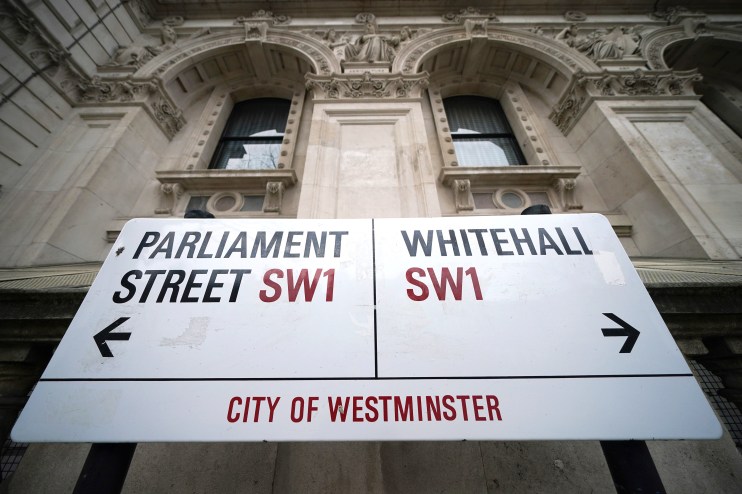‘Lavish’ spending culture of government ministers including £345,000 ‘restaurant and bar’ bill revealed

Ministers are accused of overseeing a “lavish spending” culture in Whitehall with taxpayers’ money wasted on luxury items, after Labour analysis of government procurement cards.
Concerns were raised over alcohol and dining purchases by the Labour Party including almost £345,000 by foreign office officials in 2021 under the heading “restaurants and bars”, as well as entertainment spending and evidence of end-of-year sprees to use up budgets.
Deputy Labour leader Angela Rayner said the investigation into the use of the government procurement cards (GPCs) revealed a “scandalous catalogue of waste”.
The party has compiled a dossier on the use of the cards which showed that across 2021 for 14 major Whitehall departments, a total of at least £145.5m was spent using GPCs.
That figure was up from £84.9m in 2010/11 in the equivalent departments, although around £20m of the difference could be explained through inflation.
But transport minister Richard Holden accused Labour of wasting civil servants’ time on information already in the public domain.
“In the big picture, what we’ve seen since 2010, is an 85 per cent reduction in this,” he told ITV’s Good Morning Britain.
“All of this data is publicly available online, it has been since 2012 — something which didn’t happen under the last Labour government.
“The Labour Party has spent half-a-million pounds asking parliamentary questions, 2,500 of them, wasting my civil servants’ time for information that is already publicly available and that they hid when they were last in office.”
Labour’s work examined the main Whitehall departments apart from the Ministry of Defence, which the opposition claimed had not produced sufficiently comprehensive data.
The dossier showed:
- In 2021, £3.3m was spent on office supplies, £1.51m with Amazon, almost £415,000 at Enterprise Rent-a-Car, almost £238,000 at Ikea, nearly £106,000 at John Lewis and more than £101,000 at Apple;
- The biggest single supplier was BFS Group, provider of food to the Prison Service, with sales over £500 worth a total of £54.9m;
- On March 30, 2021, when Rishi Sunak was chancellor, the treasury spent £3,393 buying 13 photographs from the Tate Gallery to hang in the Horse Guards Road building;
- Then-attorney general Suella Braverman and her Ukrainian counterpart visited fine dining Indian restaurant The Cinnamon Club in Westminster along with six others in May 2022 at a cost of £909 – just under £114 a head;
- From January 2021 to June 2022 the FCDO spent £11,853 at upmarket store Fortnum and Mason.
Rayner said: “Britain may be facing the worst cost-of-living crisis for decades, but whether as chancellor or prime minister, Rishi Sunak has failed to rein in the culture of lavish spending across Whitehall on his watch.
“Today’s shocking revelations lift the lid on a scandalous catalogue of waste, with taxpayers’ money frittered away, while in the rest of the country, families are sick with worry about whether their pay cheque will cover their next weekly shop or the next tranche of bills.”
Holden, who was quizzed about the spending details as he toured broadcast studios, called Labour’s proposal for an Office of Value for Money “straight out of Yes Minister”.
He said he was “not going to attempt to justify every individual piece of government spending on these cards”, as he suggested that Mr Sunak was unlikely to have personally approved the Treasury spending on fine art photographs.
Shadow attorney general Emily Thornberry, who was behind many of the questions which disclosed details, said: “If you went by the spending revealed in this report, you would think we were in the last days of Rome, not the worst cost-of-living crisis for decades.”
GPCs are the preferred civil service method of purchasing low value goods or services, with the benefit of providing prompt payments for small and medium-sized firms.
Rules on GPCs were relaxed during the pandemic, allowing individual card-holders to spend up to £20,000 a transaction and £100,000 per month and allowing use across all categories.
A senior Conservative source said: “Awkwardly for Labour HQ they’ve forgotten that they introduced these ‘civil servant credit cards’ in 1997.
“By 2010 Labour was spending almost £1 billion of taxpayers’ money on everything from dinners at Mr Chu’s Chinese restaurant to luxury five-star hotels.
“The Conservatives swiftly stopped their absurd profligacy, cutting the number of cards, introducing a requirement for spending to be publicly declared and introducing controls.
“Typically, Labour’s ‘big idea’ is to spend millions to establish yet another quango, stuff it with thousands of bureaucrats and give them gold-plated pensions.”
